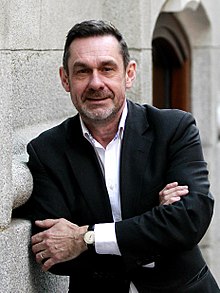Paul Mason (journalist)
British journalist
Paul Mason (born 23 January 1960) is an English journalist and broadcaster. He was Culture and Digital Editor of Channel 4 News, becoming the programme's Economics Editor on 1 June 2014, a post he formerly held on BBC2's Newsnight programme. He is the author of several books, and a visiting professor at the University of Wolverhampton.

| This article on an author is a stub. You can help out with Wikiquote by expanding it! |
Quotes
edit- Globalisation was an unstoppable natural process; free-market economics simply the natural state of things. But when the country that designed globalisation, imposed it and benefited from it most votes against it, you have to consider the possibility that it is going to end, and suddenly. If so, you also have to consider a possibility that – if you are a liberal, humanist democrat – may be even more shocking: that oligarchic nationalism is the default form of failing economies.
- An economy based on information, with its tendency to zero-cost products and weak property rights, cannot be a capitalist economy.
- This new generation of networked people understand they are living through a third industrial revolution, but they are coming to realize why it has stalled: with the credit system broken, capitalism cannot sustain the scale of automation that is possible, and the destruction of jobs implied by the new technologies.
- The economy is already producing and reproducing a networked lifestyle and consciousness, at odds with the hierarchies of capitalism. The appetite for radical economic change is clear.
- A basic income paid for out of taxes on the market economy gives people the chance to build positions in the non-market economy. It allows them to volunteer, set up co-ops, edit Wikipedia, learn how to use 3D design software, or just exist. It allows them to space out periods of work; make a late entry or early exit from working life; switch more easily into and out of high-intensity, stressful jobs. Its fiscal cost would be high: that’s why all attempts to enact the measure separately from an overall transition project are likely to fail, despite the growing number of academic papers and global congresses dedicated to it.
- What happens to the state? It probably gets less powerful over time – and in the end its functions are assumed by society. I’ve tried to make this a project usable both by people who see states as useful and those who don’t; you could model an anarchist version and a statist version and try them out. There is probably even a conservative version of postcapitalism, and good luck to it.
- Once the Internet of Things is rolled out, we are at the real takeoff point of the information economy. From then on, the key principle is to create democratic social control over aggregated information, and to prevent its monopolization or misuse by states and corporations.
- They are the working class 'sublated' – improved upon and replaced. They may be as clueless as to strategy as the workers of the early nineteenth century were, but they are no longer in thrall to the system. They are enormously dissatisfied with it. They are a group whose diverse interests converge on the need to make postcapitalism happen, to force the info-tech revolution to create a new kind of economy, where as much as possible is produced free, for collaborative common use, reversing the tide of inequality. Neoliberalism can offer them only a world of stagnant growth and state-level bankruptcy: austerity until death, but with an upgraded version of the iPhone every few years. And the freedom they cherish is perennially hemmed in by the neoliberal state – from the NSA’s mass surveillance techniques to those of the Chinese internet police. Above their heads, politics in many countries has become infested by a kleptocratic mafia, whose strategy is to deliver growth at the price of suppressing freedom and expanding inequality.
How do we fight the loudmouth politics of authoritarian populism? (21 November 2016)
edit- How do we fight the loudmouth politics of authoritarian populism?, The Guardian (21 November 2016)
- They are cynical about human rights. They don’t like immigrants or the European Union. They want the state to be strong and “defence”, generally, to mean attack. They are, basically, the racist grandad who is going to spoil your Christmas. These are the people pollsters have labelled “authoritarian populists”.
- When Reagan and Thatcher came to power, "authoritarian populism" was a term academics used to describe their politics. Now it’s a phenomenon, growing rapidly, cutting across old definitions of left and right, goes the argument. But it’s not so simple and the phenomenon is not new. The term "authoritarian populist" is a construct that, if we are not careful, could blind us to the real roots of centrism’s sudden crisis – and to the answers.
- For the big-mouthed racist right, theirs is a rebellion in favour of order. For them, as in the 1930s, all variations – of gender, race or sexuality – have to be interpreted as the strong versus the weak. They love the theatre of the mass rally, where the charismatic leader – the magic helper, as Fromm called him – can browbeat them so hard with illogic, that when "experts" confront them with the facts it does not matter.
External links
edit- Paul Mason on Twitter
- Mason at London's Frontline Club, 23 April 2009
- Official website of BBC's Newsnight programme
- Paul Mason bio on BBC website
- Website of Meltdown, the End of the Age of Greed
- Daily Telegraph
- Interview Mute magazine 2012
- Interview with Canadian Broadcasting Corporation - Ideas with Paul Kennedy - Posted 25 Nov 2015